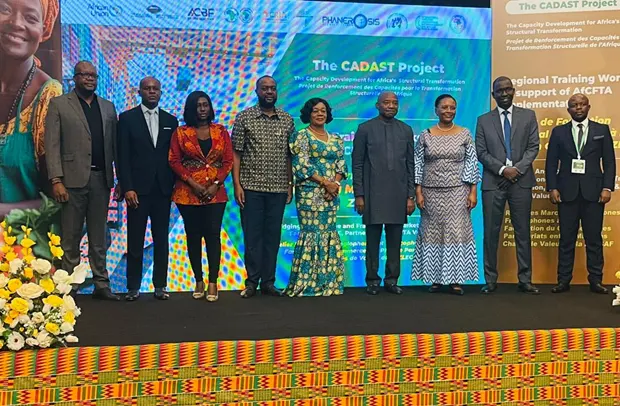Dignitaries at the event
The Africa Capacity Building Foundation (ACBF) has launched the Capacity Development for Africa’s Structural Transformation (CADAST) project to enhance macroeconomic policy management, equipping the national and regional institutions with training and technical assistance.
Head of West and Central Africa Regional Office and Director of Programmes and Impact, ACBF, Mbacke Niang, said by focusing on evidence-based policy, CADAST will aim to strengthen the capacity to implement the Africa Continental Free Trade Area (AfCFTA) agreement effectively.
He said this during the CADAST Regional Training Workshop in support of AfCFTA implementation on the theme, “Bridging Anglophone and Francophone Markets through Trade Facilitation, SME Partnerships and AfCFTA Value Chains.
Mr. Niang stated that, AFREXIMBANK’s commitment to facilitating trade and economic cooperation cannot be overstated and their support through the Capacity development for the AfCFTA implementation project is invaluable.
“By enhancing our understanding of trade dynamics and providing access to financial resources for small and medium-size enterprises, AFREXIMBANK is helping to create an environment where businesses can flourish and contribute to the boarder economic landscape,” he said.
Reading on behalf of the Secretary General of AfCFTA, Wamkele Mene, Abdul Kamara said the workshop provides a critical platform to equip Small and Medium-sized Enterprises (SMEs), MDAs from across Africa with the tools and knowledge to navigate the AfCFTA framework.
He explained that, AfCFTA holds an immersed transformative power, making a significant stride toward integrating African markets beyond existing regional agreements.
However, he stated that realising this vision necessitates addressing the lingering challenges of colonial legacy including linguistic, legal and institutional disparities that have hindered regional and continental integration efforts, with the Anglophone and Francophone divides being a notable example.
“Nevertheless, this diversity also presents an opportunity to demonstrate Africa’s strength in unity,” he added.
This workshop, he said, represents a crucial step in overcoming these challenges and by fostering cross-linguistic and regional collaboration, “we can develop the necessary capacity to integrate economies establish resilient value chains and ensure inclusive growth”.
“As Africa’s gateway to economic transformation, the AfCFTA will harmonise trade frameworks, leverage digital innovation and bridge linguistic and regional divides,” he added.
By Janet Odei Amponsah


